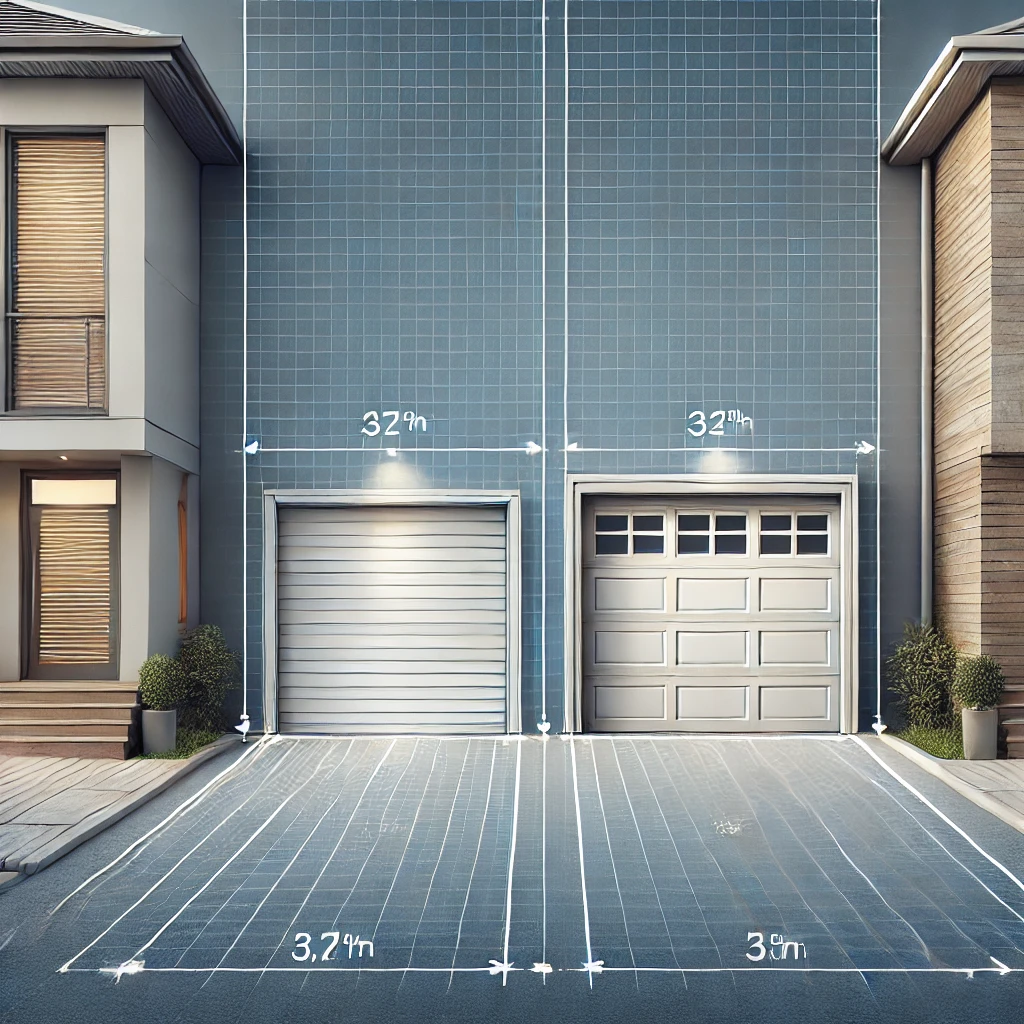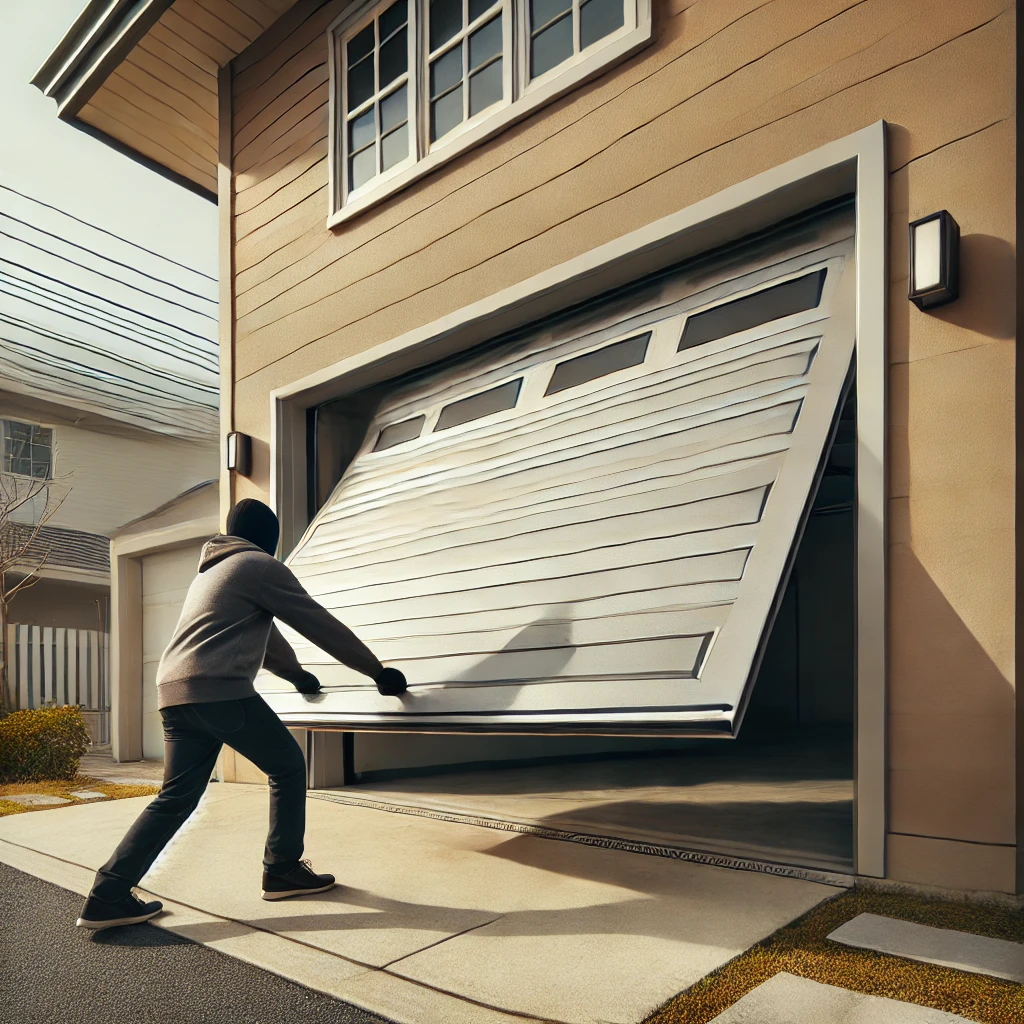Choosing the right garage door width can seem like a small detail, but it makes a big impact on your daily life. Imagine squeezing your car into a space that’s just a little too tight—frustrating, right? Getting the width right ensures easy access for your vehicles, and extra storage space, and even adds to your home’s curb appeal.
This guide covers standard and custom garage door widths, from single to double doors, and even oversized options for RVs and boats. We also discuss factors like driveway space, future-proofing, and how your door’s width can enhance your home’s exterior design.
Keep reading to learn how to choose the perfect garage door width for your home, ensuring a practical, stylish, and long-lasting solution that suits your needs now and in the future.
Standard Garage Door Widths: What to Expect
- Single Garage Doors
The most common garage door for single-car garages is between 8 and 10 feet wide. A door 8 feet wide is ideal for smaller cars and compact garages, providing enough room for parking and opening car doors. If you own a mid-sized sedan or SUV, consider a 9- or 10-foot wide door for easier maneuvering and more storage space. Standard heights typically range between 7 and 8 feet. These doors are often used in suburban homes with limited driveway space and are more affordable due to their size and ease of installation.
- Double Garage Doors
Double garage doors, measuring between 16 and 18 feet wide, are designed for two vehicles. They’re ideal for homes with multiple cars or larger vehicles such as trucks, SUVs, or vans. The 16-foot width is the most common, while 18 feet allows more clearance for two larger vehicles or added storage. If you frequently park two cars in your garage, the extra space of a double door helps avoid tight fits and accidental scrapes. Double doors are often used in detached or attached garages, giving your home a more spacious, balanced look.
- RV and Oversized Garage Doors
For those who own oversized vehicles like RVs, boats, or trailers, standard garage doors won’t cut it. Custom-sized doors are necessary in these cases, with widths ranging from 12 to 20 feet and heights extending beyond the standard 8 feet—sometimes up to 14 feet. These larger doors ensure easy access and protect your investment, especially when the vehicle isn’t used regularly. RV doors are becoming more popular in rural and suburban areas where homeowners want to accommodate larger recreational vehicles without renting offsite storage.
- Custom Garage Doors
While standard garage doors meet most needs, some homeowners require custom sizes to accommodate unique layouts, extra storage, or specific design preferences. Custom garage doors can be as narrow as 6 feet or as wide as 20 feet. These are typically used in homes with irregularly shaped garages or for additional room for recreational or work-related equipment. Custom doors also offer flexibility in materials, finishes, and design, allowing homeowners to match the door perfectly to their architectural style.
Factors to Consider When Choosing Garage Door Width
- Vehicle Size
The size of your vehicle is the most important consideration when selecting the right garage door width. If you drive a compact car, an 8-foot-wide door may be sufficient. However, larger vehicles such as SUVs, trucks, and minivans typically require at least a 9—or 10-foot-wide single-door or a double-door if you need to park more than one car. Consider the vehicle’s width and how much space you need to open the doors or load/unload items comfortably.
- Garage Space and Layout
The layout of your garage determines how wide your garage door can be. Measure the width of your garage opening carefully and assess whether the space includes any obstructions, such as pipes, shelves, or support beams, that might limit door installation. If your garage doubles as a storage space, workshop, or recreational area, you might prefer a wider door to accommodate these functions. Plan for at least 1-2 feet of clearance on either side of the vehicle for easy maneuverability.
- Driveway Length and Accessibility
Your driveway’s length and width can also influence your choice of garage door. If you have a narrow driveway or one that curves sharply, aligning your vehicle with a smaller garage door might be challenging. In such cases, a double or custom-width single door may provide easier access. Additionally, wider doors are more forgiving in tight driveways, reducing the risk of scratches or dents when parking.
- Climate Considerations
The climate may also impact the width of your garage door, depending on your location. In regions with heavy snowfall, a wider door can be beneficial for easier snow removal and vehicle access during winter months. Some homeowners in hurricane-prone areas may also choose reinforced, wind-resistant custom garage doors, which can be manufactured in wider sizes to accommodate both vehicles and additional protective measures.
- Future-Proofing Your Garage
When choosing a garage door, think ahead. Will you need a wider door in the future for a larger vehicle, or do you plan to convert part of your garage into a workspace or storage area? If you plan to purchase a larger car, such as a truck or van, or install new equipment, opting for a wider door now can save you from costly renovations later. Future-proofing your garage is especially important for homeowners who plan to age in place and may need easier access over time.
The Impact of Garage Door Width on Curb Appeal
- Symmetry and Visual Balance
The width of your garage door can significantly affect the appearance of your home, and if it becomes damaged, timely garage door repair is crucial to maintain that look. A single, wider door offers a more streamlined appearance, especially in modern homes where clean lines are emphasized. Two single doors side by side can add architectural interest and balance to traditional homes. If your garage occupies a significant portion of the home’s facade, choosing a width that complements the overall design is essential rather than overpowering it.
- Design Flexibility with Double Doors
Double garage doors provide a sleek and unified appearance to the home. They can be a focal point of the exterior and are often designed with decorative elements such as windows, paneling, and custom hardware. Homeowners can choose from various materials like wood, aluminum, steel, or composite to complement the aesthetic of their home. A double door can also enhance your home’s resale value by giving it a more upscale appearance.
- Matching Your Home’s Architectural Style
The architectural style of your home should guide your garage door choice. For example, a wide, minimalist garage door suits a contemporary or modern home, while a series of narrower, detailed doors might fit better with a traditional or colonial home. Barn-style or carriage house garage doors are becoming increasingly popular and can be customized to specific widths to achieve the desired look.
Customizing Garage Door Widths for Unique Needs
- Accommodating Special Vehicles
Certain vehicles require more space, whether it’s a vintage car, an RV, or a boat. Custom-width garage doors are ideal for accommodating these larger vehicles. A typical RV requires a door that is not only wider but taller, with custom heights often reaching 12 to 14 feet. This ensures the vehicle fits comfortably, protects it from the elements, and reduces the need for off-site storage.
- Additional Storage or Workspace
If your garage functions as more than just a place to park your car, you may benefit from a wider door to accommodate storage for tools, bikes, or lawn equipment. A custom-width door allows more flexibility in how you use the garage, especially for those who want to create a home workshop or hobby space. Wider doors make moving large equipment in and out of the garage easier without restriction.
- Design and Materials Flexibility
Custom garage doors offer a wide range of design and material choices, making matching your home’s style easier. Whether you prefer the warmth of natural wood, the sleekness of steel, or the energy efficiency of insulated doors, custom doors allow you to select the perfect combination of form and function. With custom widths, you can also incorporate unique features such as extra windows, intricate paneling, or distinctive hardware.
Frequently Asked Questions (FAQs)
What is the minimum size for a garage?
The minimum size for a single-car garage is typically around 10×20 feet (3×6 meters). This provides enough room for a vehicle but may leave limited space for storage or movement around the car. A slightly larger garage, such as 12×20 feet, is often more practical.
What is the best size for a home garage?
The best size for a home garage is usually 20×20 feet (6.1×6.1 meters) for a two-car garage. This size allows ample space for two vehicles and additional room for storage. If you need more workspace or storage, consider upgrading to a 24×24 feet (7.3×7.3 meters) garage.
How wide is a standard 2-car garage?
A standard 2-car garage is typically 18 to 20 feet wide. This width accommodates two average-sized vehicles with extra room for opening doors and moving around. A wider garage, around 22 to 24 feet, provides even more comfort and storage options.
How do I choose a garage size?
When choosing a garage size, consider the number of vehicles, their sizes, and your storage needs. For example, a 1-car garage typically measures 12×20 feet, while a 2-car garage is 20×20 feet. Larger vehicles or extra storage may require more space, so plan accordingly.
Is 10 feet wide enough for a garage?
A garage that is 10 feet wide can accommodate a single car but may feel tight. It’s generally considered a minimum width, providing little room for maneuvering or additional storage. A wider garage, around 12 feet, offers more comfort for parking and accessing the vehicle.
The Bottom Line: Choosing the Right Garage Door Width for Your Home
Selecting the correct width for a new garage door is a crucial decision that impacts both the functionality and aesthetic of your home. Whether you’re opting for a standard size or a custom door, it’s essential to consider factors like vehicle size, garage layout, future needs, and overall curb appeal. A well-chosen new garage door enhances not only the usability of your garage but also your home’s exterior design, adding to its value and visual appeal.
By carefully evaluating your current and future requirements, you can ensure that your garage door meets your needs for years. Whether you’re replacing an old door or installing a new one, investing in the right width will provide convenience, security, and style, ultimately increasing your home’s overall value and satisfaction.
End Note
At Patrick Allen Companies, we understand that the right garage door width can transform your garage’s functionality and enhance your home’s curb appeal. Whether you need a custom garage door for your home or specialized overhead doors and loading dock equipment for your business, we offer comprehensive services to meet every need. For residential customers, our offerings include garage door installations, repairs, and replacement windows—you can explore our full range of residential services here. Businesses can rely on our commercial solutions, which include fire doors, traffic doors, and glass options, available here.
At Patrick Allen, we are committed to delivering quality and durability in every project. Check out our latest industry tips and updates on the blog here, or get to know our team and company philosophy through our About page here. Ready to talk about your next project? Reach out to us via the contact page here. If you’re considering a career with us, explore current job openings here. For all your garage door needs, visit patrickallen.com—we’re here to help!



